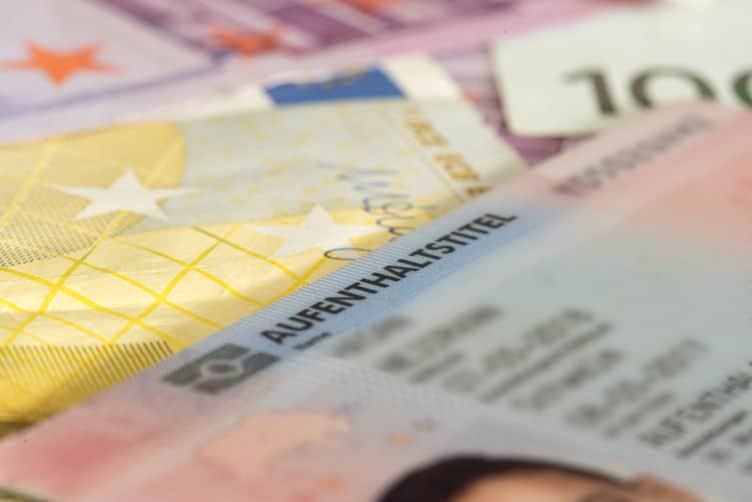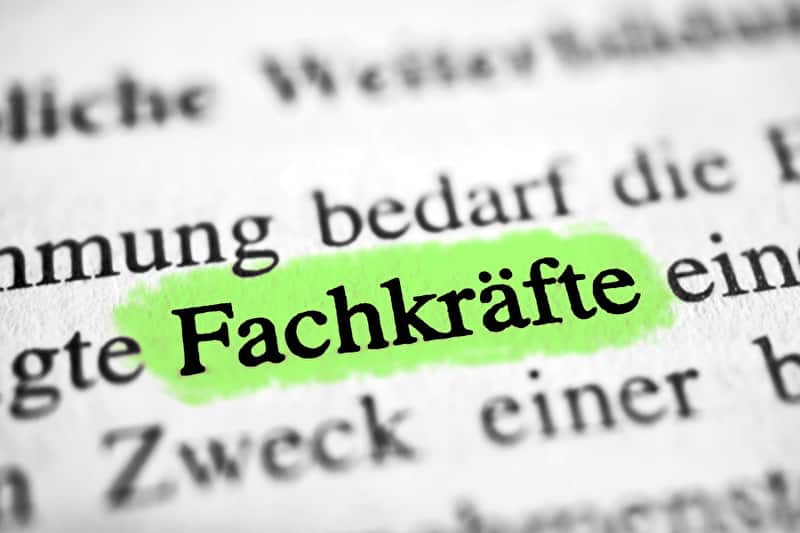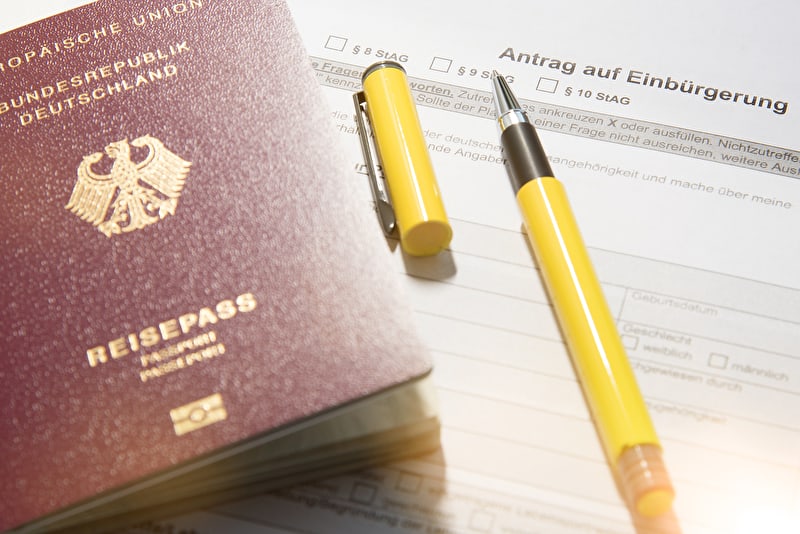The settlement permit is a residence title for individuals who are not from the EU or the European Economic Area (EEA). In residence law, a distinction is made between temporary and permanent residence titles. The settlement permit and the EU long-term residence permit are the only two indefinite residence titles in the Residence Act.

The settlement permit exists in various variants with different conditions for issuance, which mainly depend on the type of previous residence permit. To obtain a settlement permit, the applicant must be employed and be able to fully, predominantly, or significantly secure the livelihood of all family members living in Germany, such as children and spouses.
Further requirements for issuance include, for example, knowledge of the German language, basic knowledge of the legal and social system and living conditions in Germany, sufficient housing, or, if necessary, permits required to practice a profession in Germany.
In this article, we provide an overview of the various residence titles and variants of the settlement permit, as well as the different conditions for issuance and privileges of each variant of the settlement permit.
You want to come to Germany or are already here? Starting over in a foreign country is always a challenge and involves a lot of effort and legal hurdles. As experienced lawyers for migration law, we are happy to help you with your immigration. Feel free to contact us for an initial consultation!
Overview:
The term residence title refers to a series of residence documents that allow certain nationals to enter and stay in Germany. Such a residence title is required for entry and stay in Germany according to § 4 Para. 1 AufenthG.
The residence title is mainly required by individuals from so-called third countries. Third countries are all states outside the European Union and the European Economic Area (EEA). In addition to the EU member states, this includes Iceland, Liechtenstein, Norway, and Switzerland. All other states are third countries and require such a residence title.
EU and EEA citizens as well as Swiss nationals with freedom of movement rights do not require a visa for entry or a residence permit to stay in Germany. However, there are also residence documents available for EU and EEA citizens, such as the certificate of permanent residence, the residence card, and the permanent residence card, as well as for Swiss nationals, the residence permit-CH.
In § 4 Abs.1 AufenthG, various residence permits are mentioned. A distinction is made between indefinite and limited residence permits.
Limited residence permits include:
Indefinite residence permits include:
Residence permits for asylum seekers, temporary residence permits for individuals awaiting a decision on their residence permit application, tolerated stay, and border crossing certificates are not considered residence permits.

The settlement permit according to § 9 AufenthG, as well as the EU Long-term Residence Permit according to § 9a AufenthG, are indefinite residence permits for third-country nationals. The settlement permit serves as an indefinite residence permit for the consolidation of residence in Germany.
The settlement permit entitles unrestricted employment and is not limited spatially. The difference between the settlement permit and the EU Long-term Residence Permit according to § 9a AufenthG is that the EU Long-term Residence Permit allows third-country nationals to migrate within the EU.
According to the statutory regulation in § 9 Para.2 Sentence 1 AufenthG, the settlement permit is subject to several conditions. The most important requirements include five years of holding a residence permit, securing livelihood, and providing evidence of mandatory contributions or voluntary contributions to the statutory pension insurance for at least 60 months.
Furthermore, the following conditions must be fulfilled:
According to § 9 Para.2 Sentence 2 AufenthG, the required knowledge of the German language, as well as the legal and social order and living conditions in the federal territory, are considered proven if an integration course has been successfully completed.
If you have general questions about immigration law or need competent advice, please get in touch with us! Our law firm specializes in all matters related to immigration law.
Exceptions to the requirements for granting settlement permits exist. Individuals with physical, mental, or psychological illnesses or disabilities are not required to demonstrate livelihood security, 60 months of mandatory contributions to the statutory pension insurance, sufficient language skills, or basic knowledge of the legal and social order and living conditions in Germany.
Third-country nationals exempt from the requirement of level B1 proficiency are also those with a demonstrably low integration need who are not eligible for an integration course (§ 44 Para.3 No. 2 AufenthG) or for whom participation in an integration course is permanently impossible or unreasonable (§ 44a Para.2 No. 3 AufenthG). In this case, it is sufficient to be able to communicate orally in German in a simple manner.
A similar provision applies under § 104 Para.2 AufenthG for individuals who held a residence permit before January 1, 2005. For this group of people, proficiency at the B1 level is not required; instead, it is sufficient to be able to communicate orally in German in a simple manner.
In addition to the settlement permit for third-country nationals under § 9 AufenthG, other groups of individuals can obtain a settlement permit under partially eased conditions. These include:
For skilled workers, among other things, the required pre-residence period is shortened to three years, and the proof of mandatory contributions to the statutory pension insurance is reduced to 36 months, in order to obtain a settlement permit under § 18c Para.1 AufenthG.
The pre-residence period is further reduced to two years, and only 24 months of mandatory contributions to the statutory pension insurance need to be demonstrated if the skilled worker has successfully completed domestic vocational training or studies (§ 18c Para.1 Sentence 2 AufenthG).

Read more about the topic of skilled labor immigration in this article.
If a foreign national has been granted a residence permit under § 21 AufenthG for self-employment, this group of individuals can also obtain a settlement permit under eased conditions.
The applicant must have been self-employed for three years, the self-employment must currently be successful, and further sustainable development of the self-employment must be expected (§ 21 Para.4 Sentence 2 AufenthG). Additionally, the self-employed individual and their family must have secured livelihoods. Moreover, there must be no reasons conflicting with public security or order.
For asylum beneficiaries and recognized refugees (residence permits under § 25 Para.1 and 2 Sentence 1, Alternative 1 AufenthG), § 26 Para.3 AufenthG provides for two options for settlement permits with different requirements.
According to § 26 Para.3 Sentence 1 AufenthG, asylum beneficiaries/recognized refugees are granted a settlement permit after five years of holding a residence permit under § 25 Para.1 or 2 Sentence 1, Alternative 1 AufenthG, if there are no grounds for revocation or withdrawal of asylum or refugee recognition.
In contrast to the settlement permit under § 9 AufenthG, there is no requirement to demonstrate mandatory contributions to the statutory pension insurance, and livelihood can also be partially secured through social benefits if earned income predominates. Additionally, only sufficient knowledge of the German language equivalent to language proficiency level A2 (instead of B1 under § 9 AufenthG) needs to be demonstrated.
According to § 26 Para.3 Sentences 3 and 4 AufenthG, asylum beneficiaries/recognized refugees can be granted a settlement permit after three years of holding a residence permit under § 25 Para.1 or 2 Sentence 1, Alternative 1 AufenthG. This is intended by the legislature to create a special incentive for integration for asylum beneficiaries and recognized refugees.
However, the requirements for granting a settlement permit under § 26 Para.3 Sentences 3 and 4 AufenthG are strict. Unlike the settlement permit under § 9 AufenthG, there is no requirement to demonstrate mandatory contributions to the statutory pension insurance. There is also a privilege regarding livelihood security, which only needs to be predominantly secured. This does not preclude the receipt of social benefits; however, the income from employment must still be predominantly higher than in the case of the settlement permit under § 26 Para.3 Sentence 1 AufenthG.
The language proficiency requirements for the settlement permit under § 26 Para.3 Sentences 3 and 4 AufenthG are stricter than those for the settlement permit under § 9 AufenthG. Proficiency in the German language must be demonstrated, equivalent to language proficiency level C1.
Both for the settlement permit after three years of holding a residence permit under § 25 Para.1 or 2 Sentence 1, Alternative 1 AufenthG, and after five years of holding such a permit, the requirements of § 9 Para.2 Sentence 1 Nos. 4 to 6, 8, and 9 AufenthG apply. According to these, there must be no threat to public security and order, employment must be permitted, the necessary permits for employment must be obtained, basic knowledge of the legal and social order and living conditions in Germany must be demonstrated, and adequate housing must be available.
§ 28 of the Residence Act (AufenthG) regulates the reunification of foreign family members with German nationals. This residence permit is applicable to foreign spouses, foreign minor children of a German national, or the foreign parent of an unmarried minor German for the exercise of parental care. According to § 28 Para.2 Sentence 1 AufenthG, under certain conditions, which are less stringent than the requirements for the settlement permit under § 9 AufenthG, a settlement permit can be granted to these individuals.
For this, the eligible foreign family member must have held a residence permit for family reunification purposes for three years. Additionally, the family cohabitation, especially in the case of spouses, must continue. The family member must be able to demonstrate sufficient German language skills at level B1, which can be proven through the successful completion of an integration course. There must be no grounds for expulsion, and livelihood must be secured.
The settlement permit is an indefinite residence permit, granting permanent residency in Germany. While the settlement permit itself is indefinite, the electronic residence permit issued in card format is technically valid for a maximum of 10 years. This means that the ID document can expire and must be renewed, but the settlement permit itself remains indefinitely valid.
Upon expiration, a new residence document is issued without further examination. This applies even if the underlying foreign passport, travel document, or German substitute passport has expired or has been renewed.

We answer your questions about naturalization in this article.
If the conditions for granting a settlement permit are subsequently no longer met, for example, if livelihood can only be secured through social benefits, the settlement permit does not expire. However, revocation, for example under § 51 Para.1 No. 3 AufenthG, may be considered if the settlement permit was obtained based on false information or forged documents.
According to § 52 of the Residence Act (AufenthG), the settlement permit can be revoked or, according to § 51 Para.1 Nos. 5 to 7 AufenthG, expire, for example, in case of deportation. In principle, the holder of a settlement permit according to § 55 Para.1 No. 1 AufenthG enjoys special protection against deportation or a particularly strong interest in remaining if they have held the settlement permit for at least 5 years.
The settlement permit can expire according to § 51 Para.1 Nos. 6 and 7 AufenthG if the foreign national stays abroad for more than 6 months or if the stay is not only temporary in nature. If the stay abroad is to last longer than 6 months, an extension can be requested from the immigration authorities.
If the holder of the settlement permit or their spouse has held the settlement permit for at least 15 years, the grounds for expiry under § 51 Para.1 Nos. 6 and 7 of the Residence Act (AufenthG) do not apply (§ 51 Para.2 Sentence 1 AufenthG). The same applies under § 51 Para.2 Sentence 2 AufenthG to the settlement permit of a foreign national living in a marital union with a German (§ 28 Para.2 Sentence 1 AufenthG). In both cases, livelihood must be secured, and there must be no deportation interest under § 54 Para.1 Nos. 2 to 5 or Para.2 Nos. 5 to 7 AufenthG.
Do you need support? We can help you and answer any questions you may have. Contact us by e-mail: kontakt@ra-maibaum.de or by telephone on: +49 (0) 221 598 13 595
The settlement permit is an indefinite residence permit for non-EU/EEA citizens in Germany. It can be applied for by individuals who have held a residence permit for five years and meet certain requirements. In certain cases, the settlement permit can be applied for after 2 or 3 years. The purpose of the stay in Germany or the previous residence permit is crucial.
The main requirements include employment with a secured livelihood, language skills (German at B1 level), knowledge of German legal and social systems, adequate housing, and possibly a necessary professional license.
Yes, exceptions to the usual requirements exist for individuals with illness, disability, or low integration needs. Additionally, long-term residents and family members of Germans are subject to relaxed requirements.
There are various temporary residence permits such as visas, residence permits, Blue Cards EU, etc., and indefinite residence permits such as the EU long-term residence permit.
The settlement permit itself is indefinite, but the associated ID document is typically valid for a maximum of 10 years. After that, it is renewed without further examination.
Yes, the settlement permit can be revoked or expire. This occurs, for example, if the settlement permit was obtained through false information or forged documents. The settlement permit can also expire if the holder stays abroad for more than 6 months or if the nature of their stay is not temporary. However, there are exceptions for long-term holders and spouses living in a family union with a German citizen. Additionally, an extension of the 6-month period can be requested from the immigration authorities for planned longer stays abroad.
Photo credits: Stadtratte | Canva.com
We kindly ask you to contact us by email.
We are also happy to help you by phone Monday to Friday from 9 a.m. to 12 a.m..
For legal advice appointments and Requests for new mandates, we kindly ask for a brief description of the situation by e-mail, stating your name and the phone number.
We are also happy to arrange consultation appointments via "MS Teams".